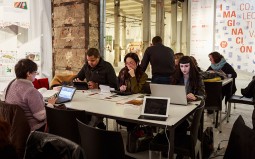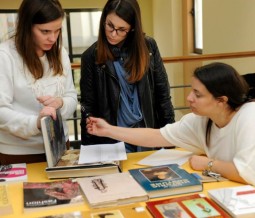Archive for February, 2015
Madrid Hosts its Very First Fashion Edit-a-thon

The capital of Spain is home to a range of renowned museums and classy inhabitants. One of these museums is dedicated to fashion and costumes: Museo del Traje. This Europeana Fashion partner, together with enthusiasts from Spain’s Wikipedia volunteers, organised our ninth Fashion Editathon on the premises of DIMAD Central de Diseño at Matadero Madrid.
Almost three years ago, Museo del Traje joined Europeana Fashion, a major European project aiming to increase fashion and costume collections’ visibility online. The initiative includes the most important museums of fashion and costume in Europe. By the end of the project, in February this year, Museo del Traje will have contributed almost 17,500 pieces from its collections. 700 of these digital objects come from the museum’s extensive fashion library.
One of the key aims for the museum is to present the fashion and historical evolution of clothing in Spain. It aims to enhance research tools in this area and therefor the idea of hosting . An edition of the project’s series of edit-a-thons fell onto fertile ground. For those who haven’t followed the blog: ‘editathons’ are events in which bloggers, writers, students and curators come together to improve articles on Wikipedia.
The Spanish fashion community had already expressed its disappointment with the lack of quality information available in Spanish online. The edit-a-thon meant a step forward and wanted to change the current situation by improving Wikipedia articles related to fashion.

Photo: Edit-a-thon Europeana Fashion, Madrid 2015. By Barcex. Available under license CC BY-SA 3.0 via Wikimedia Commons.
The fashion edit-a-thon took place in Madrid on 24 January. It, attracted 53 participants, almost 20 of which followed the activity online. Participants included students, designers, fashion bloggers, professors and people who simply love fashion.
Wikimedia Spain, whose volunteers had recently organised a massive editathon at the National Library of Spain, made sure Wikimedians were there to explain how Wikipedia work. Most participants had no previous experience with uploading content to or writting for the online encyclopedia. As we’ve seen with other fashion edit-a-thons, the topic is especially attractive to female writers, a trend that sets them apart from many other so-called GLAMwiki events.
Due to technical reasons, the activity could not be hosted at the Museo del Traje itself. Thanks to the hospitability of the Central de Diseño (DIMAD) we were able to develop the activity as scheduled. The museum’s collections department worked on a list of articles proposed to be edited and its library offered more than 90 sources to consult related to theose articles.
It was an incredibly successful event, which gathered new participants, brought together shared interests and helpful feedback from the editors. Thanks to this fashion edit-a-thon, today there is more than 32 % new fashion-related content on Wikipedia in Spanish, and this figure is going to be increasing progressively because editors promised to continue working on their own. To get an overview of all that was accomplished, check Wikipedia event’s page or take a peek behind the scenes with this collection of event photos.

Photo: Edit-a-thon Europeana Fashion, Madrid 2015. By Barcex. Available under license CC BY-SA 3.0 via Wikimedia Commons
From the Museo del Traje we want to thank Wikimedia whose, volunteers who work on the idea of spreading the free knowledge. Their mission inspired uss is to organise similar events in the future.
We also want to express our gratitude to the organisers of the edit-a-thon at Biblioteca Nacional who shared their experiences with us, and finally to DIMAD Centro de Diseño for making available their location. We encourage other institutions to carry out this activity!
Vorschlge, welche plan hausarbeit schreiben ihren wnschen und zielen entsprechen
Report on the Fashion Edit-a-thon in Athens

The Peloponnesian Folklore Foundation organized along with PostScriptum, the company which implements the ESPA program “The PFF in the digital era”, Wikipedia (Edit-a-thon) on fashion and Greek costumes last week. The event was organized in tandem with volunteers from Wikimedia Greece and the company PostScriptum, who works with the foundation on the programme “The Peloponnesian Folklore Foundation in the digital era”.
The theme of the editathon, with rich materials from Greek costume tradition, inspired fashion designers, folklore experts, costume designers, fashion historians and museologists to engage and enrich Wikipedia with entries relevant to the subject. The event took place on Saturday, February 7th at Harokopion University, which was an excellent host.Its students responded with great interest and compiled exceptional articles on the world’s free encyclopedia.
The event started with the welcoming speech from Ms. Ioanna Papantoniou, President and Founder of the Peloponnesian Folklore Foundation and Mrs. Georgitsoyanni, Vice Rector of Academic Affairs and Personnel of Harokopio University. They were followed by a brief presentation from Hercules Varlamis, Deputy Representative of Harokopio in the Greek Free/Open Source Software Society (GFOSS), which fully supports open culture efforts in Greece. Kostas Konstantinidis, owner of PostScriptum, Angeliki Roumeliotis, Head of Collections at PFF and Wikipedia editors Manos Kefalas and Paul Stamou followed suit with explanations about their involvement with Greek fashion culture and Wikipedia. Of great interest was the speech of Mr. Yannis Tseklenis, a well-known designer, who honored the event and riveted the audience with his talk about Greek Fashion.
The crowd was a varied one. Fashion designers, costume designers, dramaturgists, academics with expertise in folklore, textiles etc., museologists, computer science instructors, art historians, historians, fashionistas and teachers attended the talk. Sixteen participated in writing articles and, as they assured us, will continue to do so, in order for Greek Wikipedia to be enriched in relation with knowledge about Greek fashion.
The participants had online sources available, as well as books provided by Harokopion University and the Peloponnesian Folklore Foundation. Moreover, the organisers uploaded a unique selection of images in Wikimedia Commons in order for the participants to have materials available for the illustration of the articles.
In addition, three Wikipedia editors were present to solve any question that arose. Furthermore, the two days that preceded, training sessions in article writing had taken place, organized by the Peloponnesian Folklore Foundation and PostScriptum under the ESPA framework, and were combined with the Edit-a-thon as a supportive action.
Coffee and lunch breaks accompanied the event, while sangria and a toast to everyone who participated in the action completed the happening.
In brief, organizers and participants left very content, promising to continue this effort over time.
Report by Vasia Pierrou, PostScriptum
And how could negative performance information potentially affect a students’ ability to attend college or succeed college admission essay for nursing in a career if the data fell into the wrong hands


